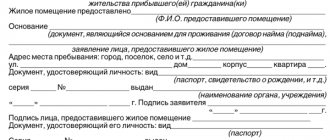How to discharge a minor child from an apartment: basis for the procedure
- purchase and sale, exchange of apartments;
- actual absence from the place of registration;
- divorce of spouses;
- changing of the living place.
How to discharge a minor child from the owner's apartment ? For each event there will be a separate algorithm for deregistration. The main point remains guaranteed alternative housing. But if we are talking about how to remove a minor child from an apartment during a divorce, then even if there is paternal and maternal living space, they will compare the square footage, living conditions, distance from kindergartens, etc. On this basis, a decision on formal eviction will be made.
Procedure
The process of deregistering children from an apartment for sale is much more complicated than the usual deregistration of minors. The seller needs to obtain the consent of the guardianship authority, draw up a purchase and sale agreement, and only then check out of the property.
Step by step procedure:
- First, you need to get an extended certificate about all residents of the apartment , for example, through the MFC, State Services or Management Company. What is required is not an ordinary certificate, but an extended certificate - the information in it is much more accurate, so that the future buyer of the apartment will not have any suspicions about the encumbrances on the housing. The certificate will be issued to parents based on a passport, certificate of ownership or extract from the Unified State Register of Real Estate.
- Secondly, contact the regional guardianship and trusteeship authority . This is entrusted to parents or adoptive parents. They must write a statement in any form. After carefully studying the application, the PLO issues its verdict - to approve the extract or impose a ban.
- Thirdly, finish registering property rights . We remind you that it will not be possible to discharge your child “to nowhere”. Therefore, along with the sale of the apartment, parents should take care of purchasing a new home.
- Finally, you can discharge the child from the apartment . Children's officials provide information about the new property. Only then will discharge be possible. You can discharge your child at the same time as registering your child in a new place. In parallel with the child under 14 years of age, parents also register. This is, in particular, stated in paragraph 2 of Article 20 of the Civil Code of the Russian Federation.
We proceed to review the application and documents. The package collected during the procedure determines whether the child will be discharged from the apartment or not? Sometimes, guardianship authorities are meticulous in checking documents for a new apartment. If they suspect something is wrong, they may issue a written refusal.
For guardianship authorities
Official permission from the guardianship authority is required both when leaving privatized and municipal housing. The first action before selling an apartment will be a visit to the district police department. Representatives of the service will tell you what documents are needed to issue an opinion.
The list may be as follows:
- original passport of legal representatives (one or both);
- minor's birth certificate/passport;
- a written statement from both parents + a statement from the child when he reaches 14 years of age;
- social tenancy agreement for municipal housing (an alternative is a move-in order);
- documents on ownership of new housing, for example - a purchase and sale agreement + certificate or extract from the Unified State Register of Real Estate;
- information about old and new housing (registration certificates);
- a personal bank account opened in the child’s name;
- certificate of persons (family members) registered in the apartment.
Registrars
Having received approval from the PLO, you can begin collecting documents to cancel the child’s registration.
The list of documents is presented:
- application on form No. 6 - filled out by parents or minors;
- certificates and passports (of children and parents, respectively);
- official documents for new housing, for example, a purchase and sale agreement or a privatization act;
- technical passport of the apartment;
- apartment or house register;
- departure sheet or statistical address sheet.
Please note that the discharge of a child is somewhat different from the usual discharge of an adult. Children need to be discharged only automatically. A statement “to nowhere” will not work. The child's parents must have documents for a new apartment in their hands. Only then can you deregister without unnecessary questions from the registrars.
Children's rights
Children who have not reached 18 years of age are registered and deregistered by the relevant authorities together with their parents , or, in their absence, by people who are given the right to do so by law.
If a minor owns property or a certain part of it, then deregistration of the person will be permissible if permission from the guardianship and trusteeship authority (hereinafter referred to as the TCA) is obtained .
To discharge a minor, the obligatory step is to obtain the consent of one parent if they have different residential addresses.
If a minor does not live in the place where he is registered, then he can be discharged after an appropriate court hearing, the result of which will be a court decision.
There are situations when parents, for various reasons, do not have parental rights. These circumstances do not deprive children of the right to continue to use the property in which they are registered.
It is prohibited to discharge a child without further registration . You must indicate at what address it will be registered in the future.
It is important to take care of the living conditions: they must correspond to the previous ones or be better .
Deadlines
The time required to issue an extract can be found in Art. 33 PP No. 713 dated July 17, 1995.
A regular extract without registration takes 3 working days. Simultaneous registration and discharge is much longer - at least 14 days. Filing an application in another city takes even longer – up to 90 days.
Consideration of applications by guardianship authorities lasts up to 14 days. Lack of documents or minor errors extend the deadline. But in general, it takes 27-30 days from contacting the OOP to immediate discharge. Thus, parents will have to wait about a month or a little more.
We talked about the timing of deregistration in the article “How many days and time does it take to check out of an apartment?”
Difficulties
Registration of minors is one of the most complex legal operations. Before you go for an extract, you need to consider all the risks.
What difficulties are associated with the procedure:
- Discharge of a child living in the grandmother's apartment requires the consent of both parents. It happens that one of the parents is against it. Then it comes to court and unnecessary expenses.
- Moving to a new building under construction does not always correspond to the interests of the child. If the property has not yet been completed and the old apartment has been sold, the child will be temporarily registered with relatives. The parents themselves will be left without registration. The situation is aggravated by delays in housing delivery or even “freezing” of construction.
- Guardianship authorities may refuse to discharge a child if they doubt the opening of a personal account in the name of a minor. It is not necessary to sell your old apartment. But then an amount equivalent to his share in the apartment should appear in the child’s account.
- The absence of a child's registration after being extracted from the old address is a reason for litigation and cancellation of the extract. The initiator of such actions is the guardianship authority. It comes to the point that parents face an administrative fine, and in some cases, the threat of deprivation of parental rights.
- Discharge of children occurs with the consent of both guardians. Lack of permission from the mother prohibits registration. However, consent is not always necessary - for example, if the mother is abroad or has been deprived of parental rights, it does not affect the situation with discharge.
- An apartment purchased with maternity capital attracts additional attention from the PLO. Government authorities ensure that the rights of the child are fully respected. Most often, transactions are simply blocked, which can lead to problems with the sale of housing.
There are many more difficulties. We examined some of them using specific examples.
Price
Typically government services are subject to fees. However, in the case of an extract from an apartment, it is completely absent. This is explained by the fact that registrars simply put a stamp. Additional documents, except for the departure sheet, are not issued. Contacting the guardianship authorities is also free.
Documentation
The basic set of papers for discharging a child from an apartment includes:
- statement;
- documents confirming the identity of the mother and father (parents’ passports);
- birth certificate of a person under 18 years of age;
- departure sheet (or arrival for registration).
In addition, the permission of the parent with whom the child will not live together is required. Consent in writing is drawn up in a notary office. If only one parent is present, a supporting document (for example, a death certificate) is submitted. If the place of residence is unknown, an explanatory note is written that explains the essence of the matter. When the child reaches 10 years old, he is asked for consent to move if this significantly changes his lifestyle (this often means a change of educational institution).
To the main package of papers, title documentation for housing is added (for example, an extract from the Unified State Register of Real Estate, as well as a social tenancy agreement, etc.).
Protection of children's rights
Despite frequent reasons for deregistration of a resident and the absence of obvious intent to infringe on the rights of a child, it will be necessary to prove the painlessness of the procedure for small residents.
The Constitution and family law of the Russian Federation strictly monitor any violations of the fundamental rights and freedoms of children. In particular, they give a citizen under 18 years of age full rights to the living space in which one or both parents are registered. Compliance with this provision lies with the guardianship and trusteeship authorities (TCA). Therefore, any action regarding the discharge of incapacitated children will have to be defended.
Discharge of a minor through court
Subjects under eighteen years of age are evicted from an apartment by court decision in a situation where they have lost the right to a real estate property or have lost the opportunity to be the owner of a real estate object. The claim is sent to the place of registration of the defendant. The participation of the board of trustees is required. In addition, when rendering a verdict, the judge takes into account the opinion of the minor, if he is ten years old.
It is important to know that deregistration of a minor through the court is excluded in a situation if:
- he acts as a participant in the privatization of a property owned by the territorial administration;
- he is the owner of the residential premises from which they plan to discharge him;
- the claim was filed by an entity interested in the housing in question.
Is it possible to discharge a child to “nowhere”?
According to the law, it is permissible to discharge a person under eighteen years of age if he registers at a different address with his relatives. The legislator prohibits discharging him to “nowhere”.
After discharge, within 3 days the minor must be registered at the new place of residence, otherwise he will be automatically registered at the previous address.
List of documents
Discharge of children from premises requires a standard minimum set of:
- Application for deregistration.
A child who has reached the age of 14 personally draws up an application, and if he is under 14 years old, this is carried out by his parents and legal representatives; - A copy of the applicant's passport;
- Copy of ID (depending on age);
- A copy of the certificate of registration of rights to real estate;
- A copy of the document with the technical characteristics of the property in which the desire to place the minor is expressed;
- Home Book;
- Departure sheet.
You cannot do without permission to discharge a child in the case where the latter is the owner of part of the property. To do this, write an application to the PLO. You also need to collect the following documents:
- A photocopy of the passport of the person submitting the application;
- Identity card of the person being discharged;
- A warrant for the property being discharged from;
- Documents for the apartment in which you plan to register;
- Passports describing the technical features of housing;
- A personal account, which is issued by an employee of the accounting department at the passport office;
- A certificate indicating all persons who are registered in the housing area.
Someone else's child
Oddly enough, it also happens that strangers may be registered in the living space. So, this often happens due to the actions of passport office employees, when they register strangers in the owners’ homes without explanation. In such a case, you will have to present evidence of the illegality of such registration.
It also happens that living space is sold without deregistration of registered entities. However, if you are considered a buyer, you must agree to such a transaction. And then, having acquired the status of property owner, with the help of the court, begin deregistering foreign citizens, including children.
Statement upon divorce
There are certain nuances in order to discharge a child under 18 years of age from an apartment that will have to be observed. A child may be deregistered if:
- He has a residence permit in his father's home, but lives with his own mother. In this case, the mother will be obliged to register the minor with her.
- The owner of the property already pays child support.
- The father has no monetary obligations to the minor, but the conditions of the other apartment are more favorable for life.
The discharge process in this case will be the same as for any real estate transaction. The main list of documents will have to be accompanied by a certificate that the marriage has been dissolved, as well as a decree on the need to pay alimony. After this, the child can be discharged from the premises without problems.
General rules and conditions for the child’s discharge
Current conditions and rules regarding the discharge of a child:
- An 18-year-old person can be discharged on a general basis. He is considered an adult.
- If the child is 14 years old, he must sign all documents himself and can make decisions himself. However, all this is only in the presence of parents/guardians.
- If a child is registered in an apartment that, during a divorce, goes to only one of the parents, it is impossible to discharge the child from this apartment without the consent of both parties (father and mother).
- Regardless of the circumstances, the child should have conditions no worse in the new apartment than in the old one.
Example: If a child in the old apartment had his own room with an area of 15 sq.m., then the new one should have the same room for him personally. Improvement is allowed, but not deterioration of conditions. Simply put, you can move a child into a room with an area of 20 sq.m., but not into a room with an area of 13 sq.m.
- If the child is the owner of the apartment, permission from the guardianship authorities is required.
- If a child is registered in a non-privatized apartment, he automatically has the right to a part of it upon privatization. That is, he will become a co-owner. As a result, permission from the guardianship authorities is required for discharge.
- If the child does not actually live in the apartment, although he is registered in it, you can try to discharge him even without the consent of the parents/guardians. But this requires a court decision and it will be very difficult to obtain it.
- Children whose parents have been deprived of parental rights retain the right to live in the apartment where they were registered.
Often, responsible persons try to play it safe and refuse to discharge even in cases where permission from the guardianship authorities is not required (the child is not a co-owner of the apartment and the parents immediately indicate the address where he will move). In this case, you can try to get permission from the guardianship authorities or immediately go to court. In both cases, the responsible person disclaims responsibility, because all actions are carried out on the basis of a court decision or permission from guardianship.
In what cases may an extract be necessary?
Typically, an extract is required if the owner sells his living space and purchases a new one. At the same time, the new apartment should not be worse than the one sold. When the child is not the owner of the premises, parents can deregister themselves by simply submitting an application and a package of documents to the passport office. In this case, the homeowner is not required to be present.
If, after discharge, parents do not complete a new registration within 2 days, they will be fined, and administrative liability is also possible. Until the age of 14, a child is registered at the place of registration of one of his parents. It is legally impossible to re-register without the mother’s consent.
But there are exceptions, for example, if the mother was deprived of parental rights. Or if she cannot be present in the process, this will require documentary evidence.
Extract from a municipal apartment
Municipal housing is housing owned by local governments.
You can't sell something that doesn't belong to you. Therefore, discharge of a child may be necessary in the following cases:
- When the parents or other legal representatives of the child move to a new place of residence.
- If a minor citizen lives at a different address for a long time.
- The child died or was declared dead or missing.
The procedure in the situation of mother and father moving to another place of residence is similar to that provided for the sale of an apartment to which the child has ownership rights. The difference in the package of documents will be the presence of a social tenancy agreement instead of an extract from the Unified State Register of Property.
Permission from the guardianship and trusteeship authorities is required to ensure that the baby is moving to a place suitable for living that meets all requirements. Moving from a separate apartment to a communal one will not be allowed.
How to obtain permission from the guardianship authorities?
The removal of a minor from the living space requires approval from the guardianship and trusteeship authority. To obtain permission, both parents must contact the Office of Guardianship and Trusteeship, except in situations where one of them is deprived of parental rights. The application indicates the new place of registration. Documents for new housing are provided as confirmation.
Attached to the application:
- passports of the child’s representatives;
- birth certificate or passport (upon reaching 14 years of age) of the child;
- an extract from the personal account at the old place of residence;
- documents for new housing.
Review of documents takes up to 2 weeks. Then the applicants are invited to the guardianship and trusteeship authority for an interview and obtaining permission or prohibition. If the child is over 14 years old, he must also be present.
General requirements
Some general points apply to all situations:
- The Main Department of Migration Affairs of the Ministry of Internal Affairs is responsible for removing people from an apartment during the sale. Previously, these functions were assigned to the Federal Migration Service, but after the merger of departments the issue passed to the Main Directorate for Migration.
- The main rule is that minors live with their parents. The procedure for registering at a new place must be taken care of in advance.
- If there is no urgent need for urgent discharge, then residents can be discharged automatically upon placement in a new apartment. The solution is not suitable if your buyer insists on transferring the completely vacated area before the transaction is submitted for registration.
- The parent or guardian is tasked with the procedure. Other relatives, even those who live in the same apartment, will not be suitable.
- The divorced parent needs to take the written consent of the other. You will be reminded about this at the passport office.
- In some regions, it is possible to discharge a minor child from an apartment when selling through the State Services portal.
- The consent of guardianship employees is not always required.
Is it possible to discharge a child?
Actually, it's possible. But with features.
Children under 14 years of age are registered at the place of residence of their parents, regardless of who is the owner of the residential premises in which they are registered. It is impossible to register such a child separately from his parents; his place of residence is the place of residence of his parents (Clause 2 of Article 20 of the Civil Code). Accordingly, it will also not be possible to discharge a child without them - if they retain their registration, the minor will also retain it.
Voluntary registration and discharge of a minor child from an apartment is possible only by his parents (or those who replace them). They can change their registration only if they change their place of residence (Article 7 of the Federal Law No. 5242-1 “On the right of citizens of the Russian Federation to freedom of movement, choice of place of stay and residence within the Russian Federation”).
Parents submit an application for registration at a new address or for deregistration at the old one, and that’s the end of it (clause 31 of the Rules, approved by Decree of the Government of the Russian Federation of July 17, 1995 N 713). The presence of the home owner is not required.
Extract from a municipal apartment
Yes, the type of housing matters. The fact is that children, along with other residents of a municipal apartment, have the right to privatization, and, accordingly, a potential share in the ownership of it. Therefore, discharging a minor child from a municipal apartment without providing equivalent housing may be contrary to his interests. Courts, for example, may generally regard such actions as an arbitrary and unreasonable deterioration of the child’s living conditions, resulting in the loss of the right to privatization (Determination of the Moscow City Court dated June 2, 2016 No. 33-21423/2016).
Therefore, if you are going to discharge a minor from a municipal apartment, initially coordinate this issue with the guardianship authorities. We see no other way out.
What documents are needed?
Before discharging a child from an apartment when selling an apartment, you will need to collect an extensive set of documents. Let's look at what it includes and how to get it.
An application with a request to authorize the transaction and a list of applications for minors under 14 years of age is submitted by legal representatives. Upon reaching this age, the owner draws up a petition independently.
- Passports and consents:
- original passports of all adult owners of the housing being sold and purchased;
- written consent of all owners, certified by a notary or written in person when submitting documents;
- birth certificate or passport of the child;
- from children aged 10–14 years - consent to the transaction.
- Documents for the apartment:
- a report on the assessment of the cost of an apartment, completed by a licensed organization; A list of suitable organizations can be found on the websites of large banks working with mortgages. The appraisal of the apartment along with the preparation of the report takes about a week.
- a copy of the floor plan and explication; These documents must be ordered from the BTI, the service is paid. Completion time: 10 working days.
- original (for verification) and a copy of documents on ownership of the apartment;
- a single housing document (or an extract from the house register, a personal account, a certificate of absence of rent debts) - can be obtained at the MFC or at the passport office and accounting department of the housing office.
All documents must be submitted to the MFC or social security office. The personal presence of all owners or their representatives with a notarized power of attorney is required
Review of documents takes 15 working days . When making a decision, social security employees take into account not only the area of new and old housing, but also the accessibility of schools, kindergartens, clinics, the condition of the houses, and the area of residence.
In total, it will take at least 25 working days !
After completing the transaction, you can submit documents for registration at a new address , after which the child will be automatically discharged from the previous apartment.
If the new owner requires an extract before the day of the transaction, you must indicate a new address in the application for extract. Registration and allocation of children's share in the new housing must be completed no later than three months after the sale of the previous apartment.
Procedure
The procedure for deregistration from owned living space involves the following steps :
- Submitting an application for the discharge of a minor to the passport office or the Federal Migration Service. The application must be submitted by one of the parents or jointly. If the child is 14 years old, then he is present during the procedure; if not, the parents act independently. More information about which authorities (passport office or FMS) are currently carrying out the deregistration procedure can be found here.
- Filling out the departure form at the passport office or the Federal Migration Service (form and sample).
- Receive documents in a week.
- Registration of the child at a new address.
To obtain an extract, you must provide the parents’ passports, the child’s passport (after 14 years), the house register, and documents for the apartment.
Changing of the living place
It is really difficult to implement an “apartment with a child” when the child is the owner of the property or has no parents.
In this case, in order to sell the apartment, consent from the guardianship and guardianship authorities is required. In case of simply changing the place of registration, no additional approvals are required.
But you will not be given the opportunity to discharge a minor “to nowhere.” A child can be discharged only if he and his parents are discharged at the same time.
If a family changes their place of residence, there is no need to register separately; you can do this simultaneously with registration at the new registration address.
Several documents must be submitted to the passport service office at the place of new registration:
- birth certificate or passport of the child,
- application requesting registration,
- an agreement providing the basis for registration in a new home, confirming ownership rights,
- written consent of the second spouse to register the minor at a new address if the parents do not live together.
Within three days, a notice of deregistration is sent to the branch at the old registration address.
The need for a separate extract arises in the situation of changing the city or country of residence. The above listed documents are submitted to the passport office at the old place of residence.
How to remove a child from registration in court?
In some situations, minors can be discharged from an apartment by court decision. This situation often occurs in the case of parental divorce, when the parents cannot come to a common decision about where and with whom the little citizen will live.
An appeal to the court to deregister minor children may arise when selling an apartment where they are registered.
In this case, children can be discharged both before the start of the transaction and after registration of new ownership rights to the apartment.
If the former and current owners of the apartment have not agreed on the timing of the children’s removal from the apartment, then the new owner can file a claim, providing the basis for the agreement and evidence of ownership of the apartment.
Sale of a privatized apartment where the child is the owner
If the child has rights to real estate or a share in which he is registered, the eviction procedure will be as follows.
Obtaining written consent of the guardianship and trusteeship authorities for a transaction for the sale and purchase of residential real estate.
This is the main document; if it was not possible to obtain it, the child will not be discharged under any other circumstances.
To obtain consent you need:
- One of the parents or guardians will contact the passport service at the old registration address and obtain a certificate about the persons registered in this housing.
- To provide this certificate, the following documents are required: the applicant’s passport, birth certificate or child’s passport, document confirming ownership of the apartment.
- Parents provide this certificate to the guardianship and trusteeship authorities when submitting documents. Both parents must be present, even if they do not live together. Children over fourteen years of age are required to be present when submitting documents.
The package of documents for guardianship authorities is as follows:
- – certificate of registered residents from the passport office from the previous place of residence,
- - certificate of ownership or agreement - basis,
- – technical passport of old and future housing,
- – birth certificate or passport of the child,
- – parents’ passports.
The guardianship authorities write statements from parents and children over 14 years of age about the sale and purchase of apartments.
Within two weeks, the guardianship authorities make decisions on whether or not to infringe upon the rights of the child in this situation. As a result, a decision is issued on the sale/purchase of the apartments specified in the application.
Consent from the guardianship authorities makes it possible to begin formalizing the transaction for the purchase and sale of real estate.
When you receive ownership rights to a new apartment, it is possible to register your child from the previous home at the passport office. A departure slip will be issued within up to 7 days. On the basis of which the passport service will enter registration data at the new residence address.
Discharge a child from municipal property
The algorithm for dealing with this situation is as follows:
- Take a certificate from the place of previous registration about registered persons and a copy of the personal account. This can be done at the passport office with your own passport, the child’s birth certificate or his passport, warrant or social tenancy agreement. Based on these documents, passport office employees issue a certificate stating that the child is registered in this housing.
- The personal account of the apartment can be obtained from the accounting department of the passport office.
- Obtain the consent of the guardianship and trusteeship authorities to deregister the child. Obtaining consent is carried out in the following order. The father and mother, together with a child who is over 14 years old, or without his presence if he is under 14 years old, visit the guardianship department with a package of documents. Both parents must be present, even if they do not live together and are in a state of divorce. Documents are provided in the form of originals and photocopies at the same time: a certificate from the passport office about registered persons at the previous place of work, a social tenancy agreement or a warrant for living space, a passport or birth certificate of a child, parents’ passports, an apartment’s personal account, technical passports of new and old housing .
When registering a child in privatized real estate - a document on ownership, or a basis agreement (agreement on purchase and sale, donation, inheritance or rent).
If a child is registered in municipal real estate, then a social lease agreement for new housing. On site, the father, mother, and child who has reached the age of fourteen fill out applications for discharge indicating a new address.
Applications are reviewed for about 14 days, and if a positive decision is made, permission is issued for an extract from the previous address of residence.
Based on all the documents received, the child can be discharged from public housing. To do this, the responsible tenant contacts the passport service of the previous place of residence and fills out the prescribed application forms.
If the child is fourteen years old, he fills out his application independently.
The passport office also needs to provide the passports of the tenant and the child (or his birth certificate, if the passport has not yet been issued), a social tenancy agreement, and a decision of the guardianship authorities.
Then a departure sheet is filled out there, indicating the address of the child’s new place of residence. All documents remain with the passport office employees and are returned after 7 days with the necessary marks and a departure sheet.
All that remains is to quickly register at the new registration address.
Step-by-step instructions for discharging a child under 18 years of age
Contact the registration office of the Ministry of Internal Affairs at your new place of residence.
It is acceptable to provide a package of documents through the MFC. Among the required documents you should prepare:
- application for registration at the place of residence, filled out on the spot;
- birth certificate of a minor or passport if the child’s age is from 14 to 18 years;
- passports of parents or guardians, as well as documents establishing guardianship for registration of a child under 14 years of age;
- extract from the Unified State Register (USRN) (not older than 30 days);
- If the parents live separately, you will need to attach the consent of the second to the child’s move-in.
Wait until the child is discharged.
The rules governed by the Ministry of Internal Affairs establish a three-day period for removing a child at the old address and registering at a new one.
An extract upon deregistration without simultaneous registration in another premises occurs when moving to another city or country. Then the legal representative (or a child over 14 years old in the presence of a legal representative) submits a free-form application for discharge indicating the address of departure, presenting identification documents. There is also a three-day period for processing the application.
Procedure for the discharge of a minor
The peculiarity of discharging a child from an apartment during sale (and not only) is that it is carried out together with his father and mother or guardians. In accordance with the provisions of family and civil law:
- Children are registered in living quarters with at least one parent;
- It is not allowed to deregister adults without their children or, conversely, one child without his parents.
This feature can both simplify and complicate matters. If parents are deregistered, then their children are deregistered along with them .
Minors and minors are not simply discharged from the apartment - a new place of residence must be indicated.
Such nuances can seriously complicate the forced discharge procedure. Therefore, it is recommended to seek from sellers the removal of the encumbrance and the discharge of all residents, including minors, on a voluntary basis.
But even sellers may be denied consent by the guardianship and trusteeship authority to discharge children. The reasons for this are as follows:
- Any parent or guardian does not allow the child to be deregistered;
- No new residential premises have been purchased, the specified house is only under construction;
- There is no evidence of purchasing new housing in another country where the parents plan to move, or it is not suitable for children, living conditions are worse than existing ones;
- The ex-wife refuses to sign them out of the ex-husband’s apartment or vice versa;
- Living conditions in the new place are worse than those existing at the place of current registration;
- The extract violates the rights of children and minors in any other way.
Voluntary
This method eliminates litigation between the seller and the buyer and simplifies the check-out procedure. It is further simplified if minors do not own a share in the property.
If children do not own a share in the apartment, permission from the guardianship authorities is not required when they voluntarily leave. A necessary condition is mandatory registration in new housing with one of the parents (Article 20 of the Civil Code).
The algorithm of actions is as follows:
- Collect the necessary documents: registration certificate for new housing, identification documents of the children and the parent submitting the application (passport, birth certificate).
- Appear at the territorial body of the Federal Migration Service (FMS) at your place of residence with the child if he is over 14 years old, or independently if he is a minor.
- Fill out an application form, as well as a departure sheet for each departing family member, including minors.
- Passports and certificates are handed over to the passport office employee along with the application.
- Within 5-7 days, pick up the documents with a note about deregistration.
If children are young, there is no need for them to visit the FMS. For a minor child, the application forms and departure form are filled out by the parent.
This completes the checkout procedure. All that remains is to register the children at their new place of residence as soon as possible.
Trial
If you refuse to voluntarily remove the child from the apartment, you will have to go to court. A special feature of the process is that the guardianship and trusteeship authority must be involved in the meeting.
The absence of representatives of this body in the judicial process is grounds for invalidating the court decision.
All the above provisions must be taken into account in the claims. For example, after selling an apartment, the new owner discovers that a mother and children are registered there. The claim must indicate :
- Remove a citizen from registration (first of all).
- Discharge her child with her.
If you specify only the first requirement, the court will reject the claim. After all, children are discharged with their parents, but here this condition is violated.
Sources
- https://bukvaprava.ru/articles/kak-vypisat-nesovershennoletnego-rebenka-iz-kvartiry-sobstvennika/
- https://law-divorce.ru/vypiska-nesovershennoletnego-rebenka-iz-kvartiry-pri-prodazhe/
- https://prokvartiru.com/propiska/vipisat-rebenka-iz-kvartiri
- https://pravoved.ru/themes/%D0%B2%D1%8B%D0%BF%D0%B8%D1%81%D0%B0%D1%82%D1%8C-%D1%80%D0% B5%D0%B1%D0%B5%D0%BD%D0%BA%D0%B0-%D0%B8%D0%B7-%D0%BA%D0%B2%D0%B0%D1%80%D1% 82%D0%B8%D1%80%D1%8B/
- https://ros-nasledstvo.ru/vypiska-iz-kvartiry-nesovershennoletnego-rebenka/
- https://glavny-yurist.ru/vypiska-rebenka-iz-kvartiry-pri-prodazhe.html
- https://ipotekaved.ru/prodat/vypisat-rebenka-iz-kvartiry.html
- https://pravoved.ru/journal/vypiska-rebenka-iz-kvartiry-pri-prodazhe/
- https://svoe.guru/zhilaya-sobstvennost/kvartira/vypiska/rebenka-pri-prodazhe.html
- https://prodatkvartiry.ru/pokupka-kvartiry/kak-vypisat-rebenka-iz-kvartiry-pri-prodazhe/.html
- https://info-zhilish.ru/kak-vypisat-rebenka-iz-kvartiry-pri-prodazhe.html









